Our kids took a new standardized test last year, theoretically based on Common Core standards. (Actually based on Standards of Excellence, which are literally—in my subject at least—the Common Core with one word changed.)
In some ways, the test itself is actually better than the old one, because the kids have to actually write some answers rather than bubbling them in. There’s even an essay. This means that I can justify having them write in class as test prep (because everything comes back to the test). However, it’s a new test, and it’s not particularly well-written. Their scores were terrible.
Tests Don’t Show How Hard They Tried
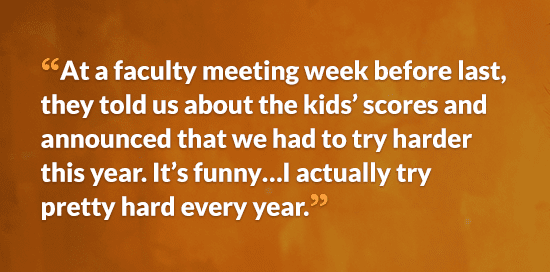
We’re a school that gets good test scores. Generally, more than 95 percent of our kids pass in everything. We knew these numbers were going to be a shock when my administration gathered 300 sixth through eighth graders in the cafeteria to tell them how bad their scores were. They said things like, “Other schools might tell you a two is passing. A two is not passing. If you got a two, you failed.” And “You’ve got to stop playing. We don’t have time to play here.” And my personal favorite, “You all just need to work harder.”
I happen to know from firsthand experience just how soul crushing this is. At a faculty meeting week before last, they told us about the kids’ scores and announced that we had to try harder this year. It’s funny … I actually try pretty hard every year. It’s not like I had an epiphany: Oh, I have to try? Sounds crazy, but I guess I’ll give it a shot next year. No more coloring sheets for us!
Their Best Efforts are Worthy of Praise
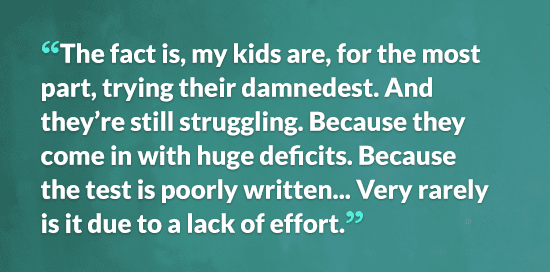
The fact is, my kids are, for the most part, trying their damnedest. And they’re still struggling. Because they come in with huge deficits. Because the test is poorly written. Because we had no way to prepare them without knowing what to expect from the test. Because they’re coming from traumatic home situations filled with abuse and uncertainty and crushing poverty. Because they still have trouble reading and writing English. Very rarely is it due to a lack of effort.
Fear Does the Opposite of Motivate
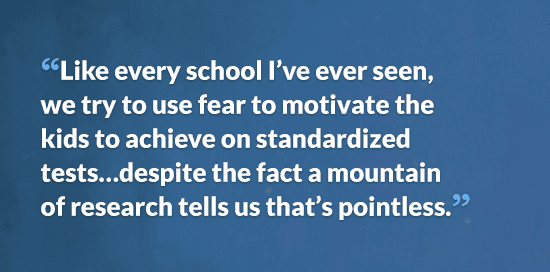
My school, like all schools, is big on research-based strategies. Anything we do with the kids, they want to see a study proving that it works. And yet, like every school I’ve ever seen, we also try to use fear to motivate the kids to achieve on standardized tests … despite the fact a mountain of research tells us that’s pointless. And I understand.
The Stakes are High
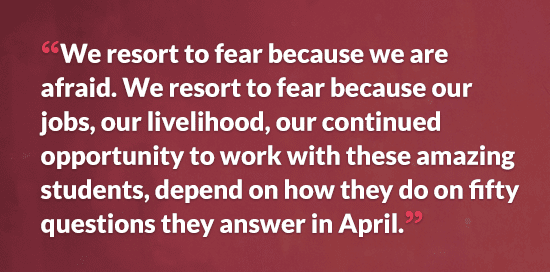
We resort to fear because we are afraid. We resort to fear because our jobs, our livelihood, our continued opportunity to work with these amazing students, depends on how they do on 50 questions they answer in April. We’re afraid because, as a charter school, we have to do better than schools with better funding and better-prepared kids, or we risk losing our charter. And we pass every bit of that fear on to a bunch of 11-year-olds in the hopes that they’ll manage a miracle for us.
But the Message Must Be Positive
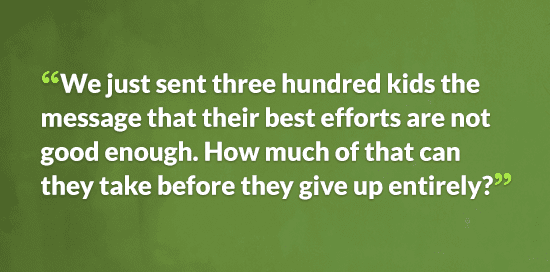
I’m angry, in case you couldn’t tell. The hallways were full of crying kids after we passed out scores. These kids worked tirelessly last year; they missed lunch and recess for review sessions, they stayed after school, they came in on Saturdays … and we told them to “try harder.” We just sent 300 kids the message that their best efforts are not good enough. How much of that can they take before they give up entirely?
None of my kids were crying. In fact, only a third of them got their scores that day. That’s because I sat down with every kid to go over scores in every subject. Our conversation went something like this. “Okay, you did get a two in math, and that’s not great. But look, you also did better than 74 percent of the kids who took the test! It looks like you had trouble with ratios, equations, and geometry. So I’ll tell you what. This year, let’s focus on fractions. I bet if you get really great at fractions—don’t even worry about the rest of it—it’ll make all the other stuff easy enough that you’ll get at least a three. So that’s the one thing I want you to put a little extra work into this year in math. Ooh, look, a four in social studies! Yay!”
It looks like you had trouble with ratios, equations, and geometry. So I’ll tell you what. This year, let’s focus on fractions. I bet if you get really great at fractions—don’t even worry about the rest of it—it’ll make all the other stuff easy enough that you’ll get at least a three. So that’s the one thing I want you to put a little extra work into this year in math. Ooh, look, a four in social studies! Yay!”
Over the next few days, I’ll be meeting with every seventh grader at the school to discuss scores. Every kid will have an action plan of three or fewer things to improve on. Every kid will know the areas in which he or she did better than the state or the system average. And every kid will have some cause for pride. But I’ll be doing all this behind closed doors, because apparently, the only message I’m supposed to give the kids is “You’re failing. Try harder.”

